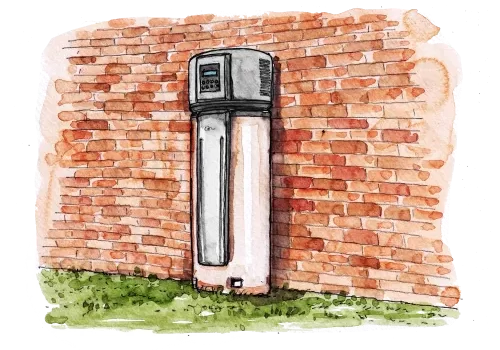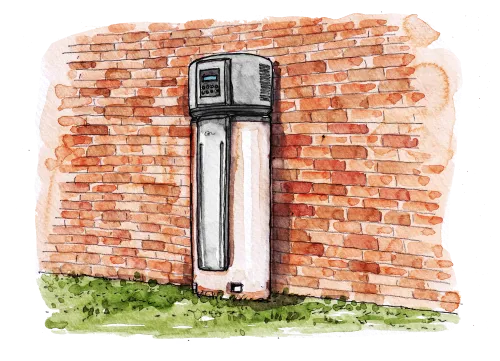What's On > News
Electrify Grey Lynn: Hot Water Heating Options
Thinking of changing your hot water heating system?
The electric hot-water cylinder is an iconic feature of the kiwi home, but it’s one of the least cost-effective methods for heating water.
Unfortunately, reducing your energy bill isn’t as simple as ripping out your electric cylinder and installing something else. If your existing water heater is still going strong, the cost of buying and installing a new heater will usually outweigh any savings in running costs. In the meantime, you might be able to reinsulate your old cylinder to improve its performance.
When you’re ready for something new, check whether a heat pump water heater is right for your home. A heat pump is the cheapest way to get hot water. They’re expensive to install but, as they’re the cheapest way to get hot water, can pay themselves off over a 15-year lifespan.
Three short years ago, gas instant water heaters were clearly the cheapest option. However, huge hikes in the price of gas have now made them less cost-effective than heat pump water heaters.
Don’t install a new gas burner in 2025. At this stage, it’s almost certain to become economically unviable by the end of its lifetime.
Have a look at these options
Electric Hot Water Systems:
Electric Cylinders (Storage Tanks): Traditionally these are what most houses in New Zealand have. They heat water using an electric element and store it in an insulated tank for later use.
-
- Pros: Relatively affordable to purchase and install, reliable, and suitable for most households. They can be mains pressure or low pressure. Modern cylinders are well-insulated, improving energy efficiency compared to older models.
- Cons: Can have higher running costs compared to other options, as they constantly reheat water to maintain temperature. Limited hot water supply if the tank size is insufficient for demand.
- Pros: Relatively affordable to purchase and install, reliable, and suitable for most households. They can be mains pressure or low pressure. Modern cylinders are well-insulated, improving energy efficiency compared to older models.
Electric Instantaneous (Continuous Flow): These systems heat water only when you need it, eliminating the need for a storage tank.
-
-
- Pros: Energy-efficient as water is not constantly being reheated. Space-saving due to their compact size. Provides an endless supply of hot water.
- Cons: Can have a higher upfront cost. May require a significant electrical load, potentially needing electrical upgrades. Water flow rate can be limited if multiple hot water outlets are used simultaneously.
-
Heat Pump Water Heaters: These are highly energy-efficient as they extract heat from the surrounding air and use it to heat the water, similar to a refrigerator working in reverse.
-
- Pros: Significantly lower running costs compared to traditional electric cylinders (up to 60-75% savings). Reduced greenhouse gas emissions. Long lifespan.
- Cons: Higher upfront purchase and installation costs. Performance can be affected by very cold ambient temperatures, although modern units are designed to work efficiently in a wider range of conditions. May produce some noise during operation.
- Pros: Significantly lower running costs compared to traditional electric cylinders (up to 60-75% savings). Reduced greenhouse gas emissions. Long lifespan.
Gas Hot Water Systems
Electrify Grey Lynn are keen to see people get off gas hot water heaters. Here’s some more info from Rewiring Aotearoa on why go electric.
Many of us have reticulated gas hot water. Gas was installed direct to the house in its hey day. Now things are changing.
- Gas Cylinders (StorageTanks): These systems use a gas burner to heat water stored in a tank.
- Pros: Can heat water faster than electric systems. May have lower running costs than electric cylinders, depending on gas prices.
- Cons: Require a gas connection (natural gas or LPG bottles). Produce greenhouse gas emissions. Can have a higher upfront cost than electric cylinders. Continuous reheating leads to energy loss.
- Gas Continuous Flow: Similar to electric instantaneous systems, these heat water on demand using a gas burner.
- Pros: Endless supply of hot water. Energy-efficient as water is only heated when needed. Compact and space-saving. Expensive to run. Can operate during power outages (if it doesn’t rely on electricity for ignition).
- Cons: Requires a gas connection. Higher upfront cost compared to electric cylinders. Flow rate can be limited. Generates greenhouse gas emissions.
Solar Water Heating: Uses solar panels to capture energy from the sun and heat water stored in a tank. Often requires a booster element (electric or gas) for times when solar energy is insufficient.
-
- Pros: Utilises a renewable energy source, significantly reducing running costs and emissions.
- Cons: High upfront cost. Performance depends on sunlight availability. Requires a suitable roof space for panel installation and a storage tank.
Key Considerations When Choosing a new Hot Water Heating System
- Household Size and Hot Water Usage: Determine your daily hot water needs to select an appropriately sized system (tank capacity for cylinders or flow rate for continuous flow).
- Energy Efficiency and Running Costs: Consider the long-term running costs and the energy efficiency of different systems to save money and reduce your environmental impact. Heat pumps are generally the most energy-efficient option.
- Upfront Costs and Budget: Balance the initial purchase and installation costs with the potential long-term savings.
- Space Constraints: Continuous flow systems are ideal for limited spaces, while storage cylinders require more room. Outdoor cylinders can free up indoor space.
- Environmental Impact: If sustainability is a priority, consider heat pumps or solar water heating.
- Climate: Auckland’s relatively mild climate is well-suited for heat pump water heaters, which perform best in warmer temperatures. Solar water heating can also be effective with sufficient sunshine.
- Building Codes and Regulations: Ensure that any new installation or upgrade complies with Auckland’s building codes and electrical/plumbing standards. For example, upgrading from a low-pressure to a mains pressure system typically requires a building consent.
It’s recommended to get quotes and advice from qualified plumbers and hot water specialists in Auckland to determine the best system for your specific needs and circumstances. They can assess your property, hot water demands, and budget to recommend the most suitable and cost-effective solution.
The installation costs vary enormously.
Interested to have recommendations from trusted locals? – come along to our event We’re in Hot Water!
Session Outline
Wednesday 4th June
465 Great North Rd, Grey Lynn
Meet in the Bar from 5.00 pm
Come early for a catch up, a drink and bite to eat.
6.00 pm
- Welcome from Electrify Grey Lynn
- Hot Water – Current and future opportunities – Jerome Partington
- Heat Pump Hot Water System – Alice Wu of Rinnai
- Heat Pump Hot Water System – Craig Teviot Dale of Panasonic
- Hybrid System Solar Heat Pump Energie System – Peter Burrell Alternative Energy CO
- State of the Art Solar Hot Water- Stefan Fortuin
- Questions and discussion
- Closing 7.45PM


